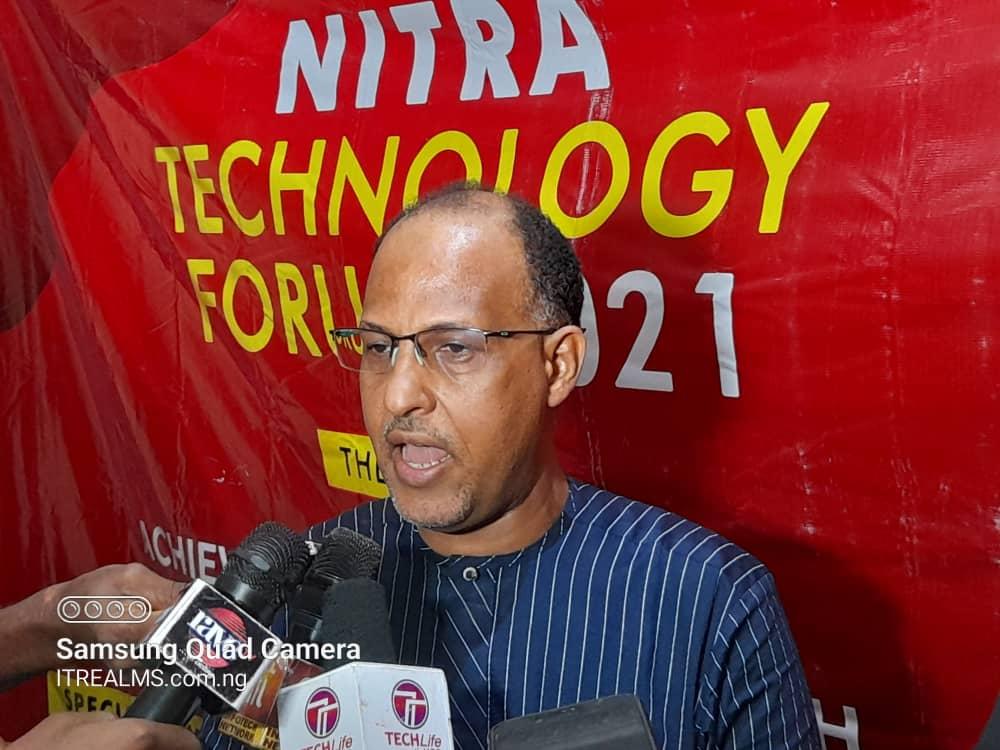
The Chief Executive Officer, Internet eXchange Point of Nigeria (IXPN), Mr Muhammed Rudman, who chaired the Nigerian Information Technology Reporters Association (NITRA) Forum 2021 during the week has spoken strongly on the benefits of achieving 30 per cent local hosting of data by 2024.
Rudman, also president of the Nigerian Internet Registration Agency ( NIRA), and has been an advocate for Internet domestication since 2006 spoke on the Theme “Achieving 30% Growth in Local Cloud Hosting by 2024” which at the Citi Height Hotel Ikeja-Lagos on May 27, 2021.
Rudman said data is the new oil, usually coined as “Data is the King”, saying that the reality is that data is the economic engine of the Internet and with billions of US dollars invested annually across the globe towards cloud infrastructure by private and public entities, Nigeria must strive to become the hub for Internet content in Africa, not just content consumers.
Local hosting of data, he said is critical for any country that wishes to develop its internet infrastructure and empower its citizens as well as ensure national data sovereignty.
Rudman said the Nigerian government’s realization of cloud localization brought about the National Cloud Computing Policy by NITDA in 2019, which is aimed at promoting the migration of National Data to the local cloud with a goal of achieving 30% by the end of 2024.
Local hosting in Nigeria will reduce the huge capital flight. This reduction in capital flight will also lead to a higher quality of service as local hosting enables websites to run about three (3) times faster than those hosting overseas because of ultralow latency, he added.
He further stated that hosting content locally will further strengthen the cybersecurity of the country, as the passing of data between local networks would be within our national borders while ensuring business continuity as Nigeria is dependent on submarine cables when hosting internationally.
While submarine cables are prone to damages by passing ships or due to natural disasters such as Tsunamis which will definitely mean a disruption to information flow, hosting content locally will help build and develop technical skills to manage data centres in the country, Rudman said.
This, also, inadvertently, means the creation of more jobs for Nigerians and the growth of the technology and hosting industry in the nation. It is imperative to host data locally to avoid the complexity of international laws.
Rather, the information and client data hosted abroad are now under the data privacy laws of the country where the data is being hosted. With local hosting, organisations and individuals are guaranteed needed support at the right time, as barriers like time difference and language are no longer an issue.
Data housing players’ business plans should be strategically focused and geared towards developing Nigeria to avoid exporting and re-importing Nigeria’s data by hosting data locally.
The IXPN chief who highlights the importance of local hosting with every opportunity, especially at the various conferences and events, said over the years Internet exchange Point of Nigeria (IXPN) has played a crucial role in the localization of data hosting within the shores of Nigeria.
He noted that the growth of local traffic at IXPN has been significant, from less than 1% traffic in 2006 to about 60% in 2020.
Referring to a report by Internet Society released in June 2020 with the title “Anchoring the African Internet Ecosystem: Lessons from Kenya and Nigeria’s Internet Exchange Point Growth” Rudman stated there has been a remarkable growth of local traffic by IXPN from 2012 when the initial study took place to the year 2020 when the report was updated.
IXPN, he said has grown the local traffic by over 40,000% (average of annual increase of 5,000%) while the cost-saving increased 40 times within the span of 8 years to Forty Million USD ($40,000,000) annually.
Today, IXPN has over eighty (80) interconnected networks, which comprises large content providers, International Carriers, Mobile Network Operators, Internet Service Providers and Educational Networks.
“We are not there yet, hence the need to sustain the sensitization! With NITRA now raising the flag higher and directed at achieving 30% growth from the existing 60%, over 80% of Nigeria’s Internet traffic should locally be accessible by 2024.
“We need to always remember that Nigeria has the population to grow any business of its choice. We need to focus and plan on how to develop our ICT infrastructure and harness the assets in order to unlock the potential of our huge population”, he added.











